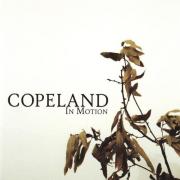
Do you ever face the dilemma of enjoying a CD so much that you can't describe what it is that makes your feet tap, your voice sing, and your heart start beating in sync with the bass drum? Friends (even casual strangers) come up to you and ask, "So, tell me about such and such. Every other word you say is about that band." And all you can do is stare wide-eyed, hand on your chest. You blame a lack of oxygen for your lack of verbal communication. So you gasp, "They're amazing," while your mind is writing a review stellar and crisp enough to land in Rolling Stone.
I face major writer's block when thinking about Copeland's newest recording, In Motion. It's an album that demands movement and exemplifies it in every note, word, intonation, and lyrical construction. While Beneath Medicine Tree stands as a stoic monument to healing, In Motion screams for shifting—a shifting toward reflection, inner hope, and poignant awareness.
The crux of the album is a movement towards love, detailing both the butterflies and the fifty-foot drops. "No One Really Wins" begs the loved one to stay, but still gives permission for them to leave if the door beckons. "Choose the One Who Loves You More" is just that—a call to remember, when all is said and done, to always choose the one who loves you more. The character Amanda is urged to stop running crazily to find love: "Hey Amanda, who just stole your heart away this time?" ("Pin Your Wings"). "Sleep" describes the dream of love: "Will I wake to find you waiting by my bedside?" The blatant romance song "Kite," with its 1930s-radio flair, says, "I'm beside myself for the touch of your lips or the grace of your eyes that can see good in me." Aaron Marsh cries in "Don't Slow Down," "You can take everything I have / Just don't leave my side."
I could go on for ages; every song drips with the beauties and pains of love, thus weaving a tale of reality. The guitars, keys, drums and bass create a soothing-yet-rocking collection. The slowness of Beneath Medicine Tree is replaced with a heavier sound. But this heaviness is still wrought with delicacy, much like the brittle tree on the album's artwork.
The song that breaks away from fragility is "Love is a Fast Song." It opens with distorted guitars one would hear on any hard rock album, but these dissolve a bit into Marsh's falsetto vocals. Soon even his voice rises to the occasion, screaming along with the distortion: "Your love is in motion, and it's spinning me around again / My heart is in motion for the movement that's in you / Your love is a fast song and I'm dancing 'cause I'm loved again / My heart is in motion for the rhythm inside you / Your love is a slow song / It's resounding through my world again / My heart is in motion for the song inside of you."
This is a paean of celebration. The broken heart found in Beneath Medicine Tree has found healing. Now that heart rejoices in euphoria. I can't escape the worshipful tone felt in this record, and that doesn't sadden me in the least. I drown in the melodies, in the lyrics, in the general theme itself (because it's known that God Himself is the very essence of love).
It appears that the more I write, the more I find to say about this record. And it's all good on this end. I wouldn't call Copeland the best band to ever hit the music scene, but they definitely turn heads. In Motion is an album that has my complete attention. While swimming the ocean of this album, I sing with my head up, with my eyes closed ("You Love to Sing").
I suppose that the next time those friends and random individuals ask me about Copeland, I'll know exactly what to say: "Grab your coat and let's go. It's time to fall in love and hold nothing back. It's time to get in motion."